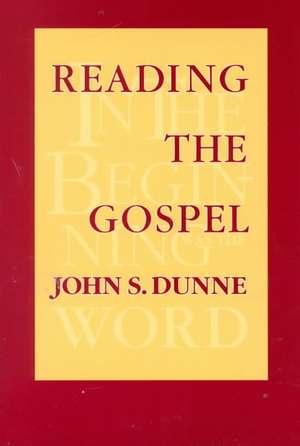Reading the Gospel
Autor John S. Dunneen Limba Engleză Paperback – 14 iul 2000
| Toate formatele și edițiile | Preț | Express |
|---|---|---|
| Paperback (1) | 198.35 lei 43-57 zile | |
| MR – University of Notre Dame Press – 14 iul 2000 | 198.35 lei 43-57 zile | |
| Hardback (1) | 586.43 lei 43-57 zile | |
| Wiley – 14 iul 2000 | 586.43 lei 43-57 zile |
Preț: 198.35 lei
Nou
Puncte Express: 298
Preț estimativ în valută:
37.95€ • 39.73$ • 31.40£
37.95€ • 39.73$ • 31.40£
Carte tipărită la comandă
Livrare economică 07-21 aprilie
Preluare comenzi: 021 569.72.76
Specificații
ISBN-13: 9780268016685
ISBN-10: 0268016682
Pagini: 200
Dimensiuni: 152 x 229 x 11 mm
Greutate: 0.33 kg
Ediția:1
Editura: MR – University of Notre Dame Press
ISBN-10: 0268016682
Pagini: 200
Dimensiuni: 152 x 229 x 11 mm
Greutate: 0.33 kg
Ediția:1
Editura: MR – University of Notre Dame Press
Recenzii
“The density of this book . . . flows from [Dunne’s] poetic grasp of God’s outpouring of love and humankind’s longing to respond. It is a density that attracts, that rewards the reader with an increasing penetration of truth.”—America, April 8, 2000
“[Dunne] hopes to teach us to read the Gospel for understanding, rather than certainty; for union, rather than knowledge. Lectio divina is the traditional term: ‘divine reading.’ It is an alchemy that, through silent openness to grace, turns the words of Scripture into the presence of Love. . . . Here is a man learned enough to pass over and back among thinkers, mystics and artists: Proust, Hammarskjold, the Buddha, Tolkien, Al-Hallaj. No dilettante, he has pondered the wise words of other eras and traditions sufficiently to appropriate some of the mysteries they hold. These he puts in dialogue with the Gospel. Without lapsing into syncretism or simple-minded equivalents, Dunne plays with wisdom. He is a poet, a troubadour. (He ends his book with ‘Songlines of the Gospel,’ a lyrical commentary on the Gospel of John.) The density of this book . . . flows from his poetic grasp of God’s outpouring of love and humankind’s longing to respond. It is a density that attracts, that rewards the reader with an increasing penetration of truth.”—America, April 8, 2000
“In each new book, this theologian at the University of Notre Dame adds luster to his expansive Christian faith, polishing it with wisdom from Islam, Buddhism, poets, fairy tale writers, literary figures, and spiritual teachers of all stripes.” —Spirituality and Health Magazine, June 2000
“John of the Cross wrote that God spoke his Word once and having spoken needed to speak no more. John Dunne teaches us just how capacious that Word is. Not for the intellectually timid, Reading the Gospel is a work of profundity.” --Commonweal, September 22, 2000
“A leader in the field of spiritual books, Father Dunne here turns his attention to the relation of Jesus to God . . . the Notre Dame theology professor offers a fresh view of the Gospels and the deep lessons his ‘odyssey of reading’ revealed.” --Notre Dame Magazine, Autumn 2000
“Those familiar with Notre Dame theologian Dunne’s penetrating reflections and artful language will not be disappointed at his latest work.” —The Bible Today, November 2000, Vol.
38, No.6
38, No.6
“Reading the Gospel, for Dunne, is no mere academic exegetical exercise in historical reconstruction, but an intensely personal affair that uses the sacred text as a springboard for a multitude of ruminations upon the human condition (‘fides quaerens intellectum’). Included are chapters on reading in general, divine reading, parables, paradoxes, turning points, presence, and ‘songlines’ of the gospel. Herein is to be found a wealth of meaning, creative originality, and finely phrased epigrams: to seek the historical Jesus is to seek understanding, not certainty; the excessive search for certainty only leads to greater uncertainty. Readers will quickly recognize Dunne’s accustomed style, that of a steady concatenation of literary quotations from a multitude of disparate sources: Schweitzer; Buber; Barthes; Hammarskjöld; Eliot; et al. This is leisure-time lectio divina at its best: theological expertise united to cross-disciplinary skills and spiritual insight.” —Religious Studies Review, January 2001
“John Dunne holds the John A. O’Brien Chair in Theology at the University of Notre Dame. He explains how a lectio divina of the gospel can deepen our spiritual life. His book is ‘an invitation to enter more deeply into the transformative power of the Gospel emerging from Jesus’ encounter with his God, which is then played out in the lives of Christians. It is also an invitation to accompany Dunne on his own profound spiritual journey as he deftly weaves into the tapestry of his work literature, theology, philosophy, and music.” —Theology Digest, Vol. 48, No. 1, Spring 2001
Notă biografică
JOHN S. DUNNE, C.S.C. (d. 2013) was the John A. O’Brien Professor of Theology at the University of Notre Dame and the author of twenty books, including Circle Dance of Time (2010), Deep Rhythm and the Riddle of Eternal Life (2008), and A Vision Quest (2006), all published by the University of Notre Dame Press.
Descriere
Using the method of spirital reading, "lectio divina" or "divine reading" as it is called in monasteries, the author of this book sets out his interpretation of Matthew, Mark, Luke, and especially John. He argues that reading the Gospels means passing over into the relation of Jesus with his God.
